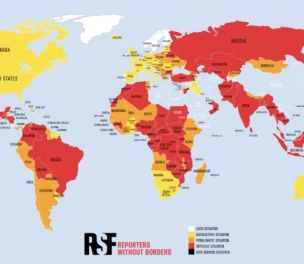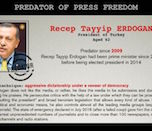Click to read the article in Turkish / Kurdish
After an interval of five years, the Reporters Without Borders (RSF) has issued its "2021 Press Freedom Predators", a list of "37 heads of state or government who crack down massively on press freedom".
While Turkey's President and ruling Justice and Development Party (AKP) Chair Recep Tayyip Erdoğan has been once again listed among the RSF's "Press Freedom Predators", a European prime minister, Hungary's Viktor Orbán, has become the first EU leader on the list:
"Nearly half (17) of the predators are making their first appearance on the 2021 list, which RSF is publishing five years after the last one, from 2016.
"All are heads of state or government who trample on press freedom by creating a censorship apparatus, jailing journalists arbitrarily or inciting violence against them, when they don't have blood on their hands because they have directly or indirectly pushed for journalists to be murdered."
'Portrait of Recep Tayyip Erdoğan'
Listed among these 37 heads of state and government by the RSF, Erdoğan's portrait has also been shared by the organization in this context.
Reminding the international community that Turkey is ranked 153rd in the 180-country RSF World Press Freedom Index in 2021, the RSF has described President and AKP Chair Erdoğan as a "predator since 2009."
Indicating the "aggressive democracy" as his "predatory method," the organization has also defined "critical journalists" as his "favorite targets". Another subheading in the RSF's "portrait of Recep Tayyip Erdoğan" is the following: "Official Discourse: Denial and Veiled Threats."
The RSF has shared the following observations, comments and criticisms about Erdoğan's treatment of the press in Turkey:
'He doesn't like the media, or rather...'
"Turkey's president does not like the media, or rather, he likes the media to be submissive and docile and to sing his praises.
He persecutes critics with the help of a law under which they can be prosecuted for "insulting the president" and broad terrorism legislation that allows every kind of abuse. By various political and economic means, he also controls almost all the leading media groups (especially TV channels).
"The state of emergency declared in July 2016 (after a failed coup) gave him the opportunity to arrest unprecedented numbers of journalists and to close more than 100 newspapers, magazines, TV channels and radio stations.
A few courts, including the constitutional court, the court of cassation and the Council of State, have managed to put off some resistance. But the deteriorated climate encourages violence against journalists.
"More than 100 have been physically attacked in the past five years and one, who worked for a radio station in the city of Bursa, was killed by a listener.
Pandemic, refugees, access blocks...
"Whether left-wing, pro-Kurdish, pro-Gülen, secularist or nationalist – any journalist or media outlet regarded as critical is liable to be prosecuted. Even if Turkey is no longer the world's biggest jailer of journalists, the risk of imprisonment and the fear of having to work under judicial control or being stripped of one's passport are still ubiquitous.
"Around 50 journalists were briefly arrested in 2020 in connection with their coverage of the situation of Syrian refugees at the border with Greece or the Covid-19 pandemic.
"Any online reporting that reflects badly on prominent people close to the government is also routinely censored. More than 1,300 links to online articles (about corruption, clientelism and the like) were blocked in 2020 by magistrates under Erdogan's thumb."
The other people on the list are as follows:
|
(HA/SD)






